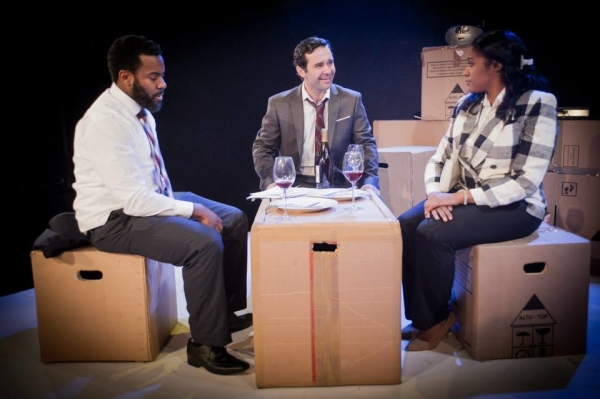Upper Cut (Southwark Playhouse)

© Bob Workman
Juliet Gilkes Romero's play examines racial representation in Parliament over that period. Starting in 2012, with only 27 of 650 elected MPs coming from an ethnic minority background, Romero slowly rewinds to 1986, two years after the first four were elected. That she borrows her structure from Harold Pinter's Betrayal tells you everything you need to know.
Upper Cut charts the careers – backwards – of two black Labour politicians, Michael Powers (Akemnji Ndifornyen) and Karen Jackson (Emma Dennis-Edwards). Powers has risen to Deputy Leader, primarily by giving up his convictions for the sake of power, while Jackson has become a marginalised presence, thanks to her increasingly hard-line stance. Thirty years earlier, it was the other way round: Powers was the rebel, pushing all-black shortlists for parliamentary candidates; Jackson, the promising party-liner.
Romero retraces their respective relationships with the Labour leadership, specifically with gruff Northern cynic and party bigwig Barry Reid (Andrew Scarborough). While Michael – note his surname, incidentally – is courted, Jackson falls out of favour over her defence of a black family killed in an arson attack, the Silverton Twelve. All this is entangled with romance: like their Pinteresque counterpoints, the three politicians are involved in two long-running trysts.
'Romero's script has more U-turns than a decade of Blair government'
The message is clear: mainstream politics is built on betrayal. Romero pins down its catch 22; that making a difference requires a position of power, but securing that power means dropping most of one's differences. Progress is partial and the status quo survives. Just as New Labour dragged the Left right to win power, black politicians have dropped their insistence on equality. "Getting elected is a victory for our people," says Michael. "It's not enough," comes Karen's reply.
It's an important argument, neatly expressed, but, as drama, Upper Cut is awfully schematic, driven primarily by dramatic irony: insider becomes outsider and vice versa, tee-totallers turn into – what else? – borderline alcoholics. Romero's script has more U-turns than a decade of Blair government.
What does for the play, though, is its tangled timeline. Michael goes from militant outsider to Labour's Next Big Thing in the space of four months, while his South London accent melts into RP overnight. Equally, I struggled to believe that the two concurrent affairs would last so long, especially when both parties seem to do nothing but argue over their irreconcilable political differences.
Lottie Wakeham's nervy production snags on the script's edges. When not sparring like Newsnight opponents, Romero's characters are busy dropping clunky exposition. One even explains Live Aid: "Last summer – Bob Geldoff, Wembley?" That was meant to change things too.
Upper Cut runs at Southwark Playhouse until 7 February










